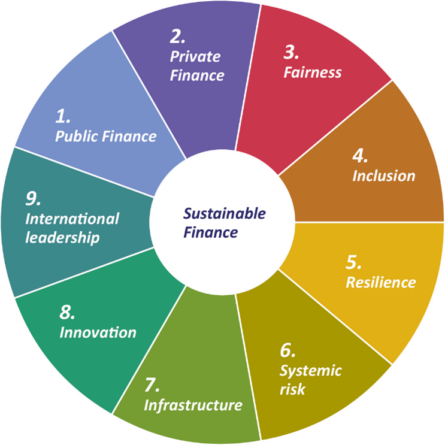The financial policy choices made in Europe over the next 18 months will shape its prosperity for decades to come.
The road to recovery from the economic impacts of COVID-19 will not be quick or easy. Our current crisis presents an opportunity to direct large-scale investment towards creating a sustainable European economy.
To achieve sustainable and ambitious financial reforms, the economic measures Europe puts in place over the next two years must be fair and inclusive. Short-term economic relief addressing the impacts of COVID-19 should not go toward financing long-term risk and inequality. Reforms should address public as well as private finance norms, including institutional architecture and governance. Their long-term success will be dependent on Europe’s ability to guide international standards.
A Vision for Sustainable Finance in Europe
Our new report, A Vision for Sustainable Finance in Europe, sets out a vision for the future of sustainable finance in Europe. Our paper makes specific recommendations for action by European institutions over the next two years. It is particularly important in regards to the upcoming Renewed Strategy for Sustainable Finance, as well as other European policy frameworks.
The report is meant to provide a helpful framework for a range of actors working on sustainable finance in Europe, including the European Commission, European institutions, civil society actors and philanthropic funders. We hope to spark readers into thinking further about the impact of their work and the common goals they are all trying to achieve, within the context of the European Green Deal and sustainable economic recovery from the pandemic.
Given the breadth and multi-faceted nature of sustainable finance, we have organised our research and recommendations under nine different themes, identified through extensive consultation with experts in the field. Our themes attempt to represent the variety and depth of sustainable finance issues in Europe. The theme selection also strives to make connections, avoiding siloed thinking.

Each chapter of the report contains several detailed recommendations for achieving a prosperous and sustainable European economy in the decades to come.
Key recommendations include:
- Public Finance – sustainability-proofing the EU budget and funding mechanisms; applying appropriate conditionality to state aid and greening national budgets and fiscal policy; and adjusting the mandates and capitalisation of public banks to achieve sustainability goals.
- Private Finance – creating disclosure plans to transition to climate neutrality by 2050; ensuring the taxonomy remains science-based and apolitical; and integrating sustainability into long-term decision-making at financial firms.
- Fairness – supporting fair access to affordable capital across Europe by the Commission and European Investment Bank; creating a pipeline of bankable projects, and addressing just transition from a wide range of actors including Member States down.
- Inclusion – ensuring citizens can invest sustainably without fear of greenwash; ensuring public access to sustainability data that affect citizens’ lives and communities; and protecting citizens from financial exclusion linked to sustainability risks.
- Resilience – considering resilience in all public finance decisions, complementing the ‘Do No Harm’ oath; adopting national and regional plans for climate adaptation by all Member States; and developing a European public-private disaster risk finance pool.
- Systemic Risk – joining up the European Supervisory Agencies on climate risk; creating a taxonomy of unsustainable economic activities by the Commission; and greening European monetary policy via the European Central Bank
- Infrastructure – creating a European Panel on Climate Change supporting Member States to make sustainable infrastructure investments; improving infrastructure project development capacity at the regional and local level; and encouraging green infrastructure bonds.
- Innovation – creating a pan-European approach to research and innovation; supporting public finance institutions and national strategies in crowding in private patient capital; and prioritising sustainability.
- International Leadership – prioritising finance for international diplomacy in 2021; maximising the impact of the International Platform on Sustainable Finance; and concentrating on sustainable reforms to public banks and development finance institutions.
Explore the key recommendations by chapter in the links above.


